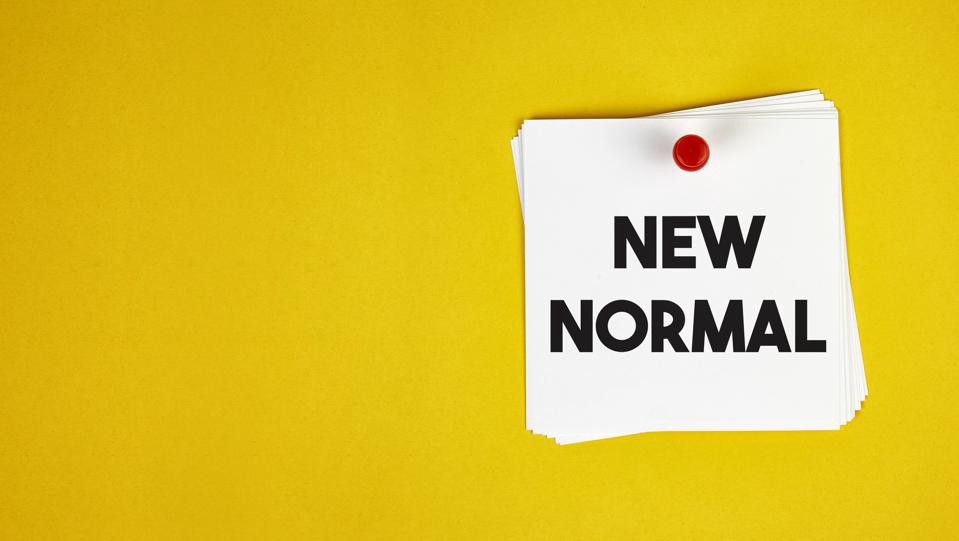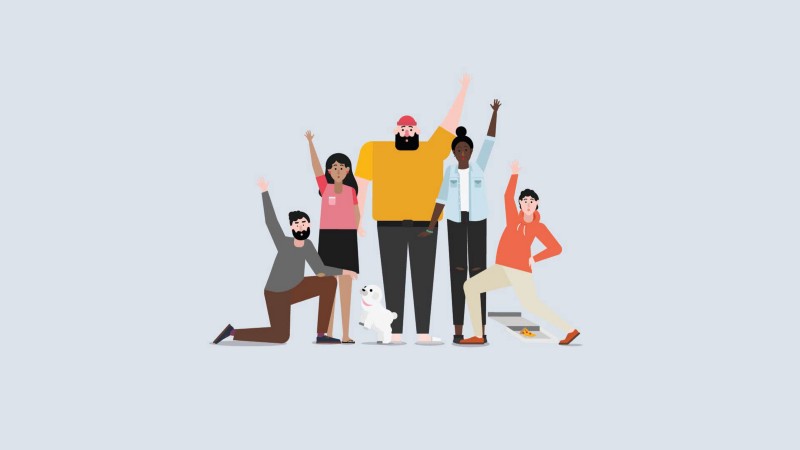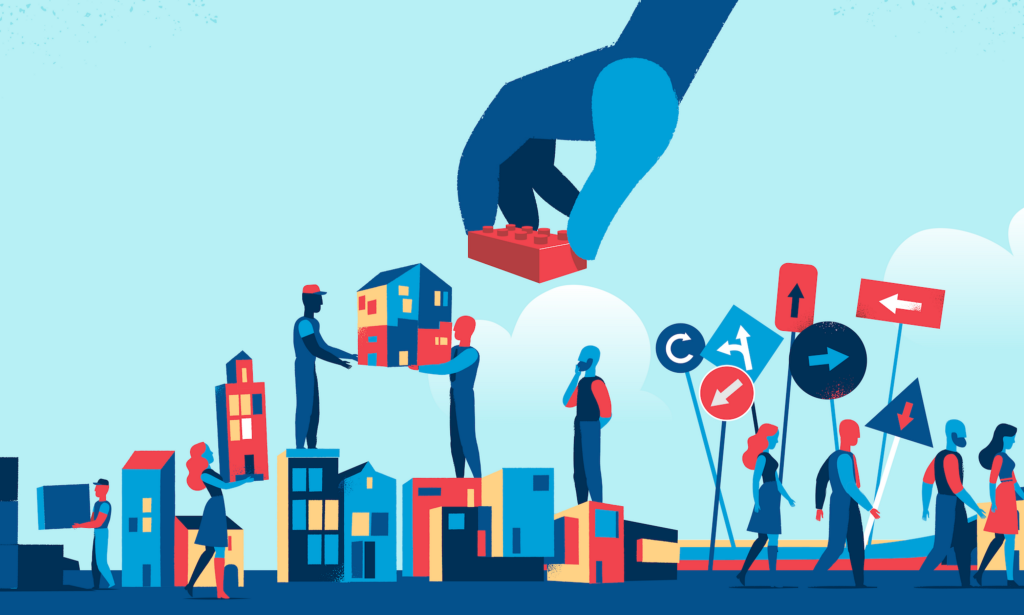

We’ll re-emerge from this moment in time, but maybe not as we were before. It might take a while and we’re likely to ease into it, there’s likely not going to be a definite point but a number of indicators. Schools re-opening for everyone and staying open is just one of those.
Despite our fight (or flight) instincts to endure this crisis and return to “normal,” history has shown us that tragic events (war, famine, disease) alter us in fundamental ways.
Perspectives shift in those times. New beliefs and mindsets have time to take shape. Behaviours and customs are forced to change and so evolve over that time. This is true of people, but also of businesses.

A lot of people are talking around a ‘Great Reset’. Some companies may be lost to the economic fallout of the pandemic, despite great government support, and those that do survive may have been forced to have changed to new shopping habits and behaviours, so will exist, but maybe in a different form.
All business leaders realise that change is inevitable, but great leaders are intentional about that change. Employees will expect leaders to continue leading with transparency, authenticity, and humanity, but now from afar.
Leaders have been forced to explore better ways of working for all, new experiences, and new business models. And they’re not waiting for quieter days when things have settled down and ‘gone back to normal’, that will be too late, and the moment will have passed to embrace the change and the ‘new normal’.
Organisations will be far more adaptable and resilient, having been forced to adapt their ways of working and explore alternative ways to work and do business. Teams have now fully tested remote working and there’s no longer the myth that ‘remote teams’ are worse the co-located teams, they just need to work differently and we’ve all been forced to understand that and have tried out what works and have left behind what doesn’t.
An ‘office’ is likely to no longer be a place you travel to daily and sit behind a desk, but instead used more occasionally to be able to work collaboratively with colleagues. There will be still some that might need to work from an office more regularly or daily, either because of technical limitations, security or due to personal preference and their own ability to be able to work from home. But for most this is likely to be a big mindset shift.

How to approach and respond to the changes that lie ahead is key. But there isn’t a boilerplate, blanket approach or magic wand that fixes everything for everyone.
Much of the leadership advice out there doesn’t acknowledge that context is king and different businesses are experiencing different problems and realities right now. SY Partner’s, a global transformation company, have found that as they’ve been guiding leadership teams, organisations are in the following modes.
Keeping context of you organisation or team is key. Many companies are in all-out ‘survival mode’, fighting to stave off competition and coming out the other side. Travel restrictions and quarantines have sidelined workers, upended supply chains, and disrupted entire industries, making layoffs, donations, and rescue packages a desperate last resort.
Others are in ‘adaption mode’, rapidly adjusting to this new reality. While cost containment and risk mitigation may be necessary first steps, these businesses are also shifting their operating models and customer experiences to ensure their continuity.
And some companies are in ‘opportunity mode’, evolving to fill an unmet need that’s opening up, be the first to adapt their operating model to support customers in new ways, now their needs are different and have shifted. These companies are looking at the changing world and seeing new ways they can be of service, transforming their businesses to pursue these unexpected opportunities.
The flood of articles on virtual meetings is hardly of help if you run an international airline or a local bookstore in survival mode.The recommendations to cut back on innovation and refocus on your core won’t make sense if your business is in opportunity mode, with a chance to manufacture protective gear or ventilators, for example.
SY Partners
In short, leaders won’t find any easy answers out there and some of this will be more meaningful than others, depending on the mode you’re in.
Take what you can use, and leave the rest.
Most leaders have a playbook for the urgent, tactical side of their crisis response: safeguarding workers, setting up a response team, modelling the economic impact, and more. This isn’t Business As Usual, but equally they’re not stranger’s to it. In these examples things do return to normal, so they’re stop gaps and there is an end in sight. But at the moment that isn’t the case so another approach might be needed.

It’s important to ensure the new normal becomes a better normal, by considering a new approach, by making sure you’re:
Leadership includes caring for others, and you can only do this well if you’re also caring for yourself. This may be a deeply frustrating thing to hear if you’re working 16-hour days while taking on the emotional strain of your family, friends, and teams. But like putting on your own oxygen mask on a plane before you attend to your fellow passengers, you can hardly care for others if you’re gasping for air yourself.

Abraham Lincoln famously attended more than 100 theater performances during the height of the American Civil War to recharge and keep his anxiety at bay. Your energy is not infinite, and merely “powering through” and “keeping it together” won’t be enough for the intensity of the weeks and months that lie ahead.
This is not just an economic and operational crisis; it’s a human crisis. No doubt you’re already doing everything possible to attend to your employees’ financial, medical, and logistical needs. Companies with the resources are implementing new time-off policies, hazard pay, remote working policies, and more.

But as Maslow Heirarchy of Needs shows, emotional needs, can become even more intense once someone’s basic physiology and physical safety are accounted for. As a leader you probably already look at human behavior, but your emotional intelligence matters now more than ever. Look for ways to create more space for humanity inside your organisation to strengthen your culture not only through this crisis, but after it.
Throughout history, different cultures have urged us to contemplate death — not to darken our lives, but to lift us above the mundane and remind us what’s most important. Though we now find ourselves in deeply unsettling times, we’re also discovering that certain things we’d been obsessing over only weeks ago, suddenly seem far less important, while others now seem more important. It’s a time of great reflection.

Organisations have been repositioning and accelerating the shift from being shareholder focussed to being people and community focussed, urging companies to play a greater role in serving others. The businesses that embrace this idea during the pandemic, using their purpose as a compass to navigate this crisis, can proudly claim they do in fact have a meaningful reason to exist.

We’re surrounded by examples of companies rising to meet the extraordinary challenges of this crisis. Some are making financial contributions to help, and that’s important. But equally companies who are using their unique strengths to create immediate impact. Nike has been convincing people to stay home, something polar opposite to ‘Just do it’, getting up, going out and getting active. AirBnb has leveraged its enormous real estate inventory to provide housing for medical workers. McLaren have been making hospital ventilators. And it’s not just big companies; local bakeries, textile manufacturers, pet groomers, and countless others are finding creative ways to help.
This is an intentional break from my ‘User Experience is …’ series of stories, to reflect, inspect and adapt to how the new normal might be a better normal. The ‘User Experience is …’ series looks at …
Originally written as part of the ‘User Experience is …’ series for UX Collective.